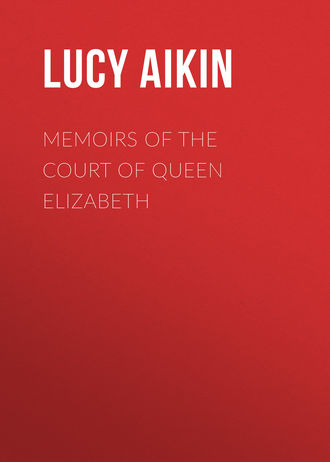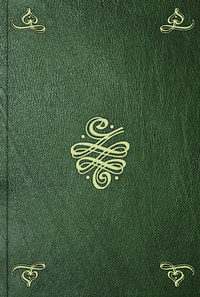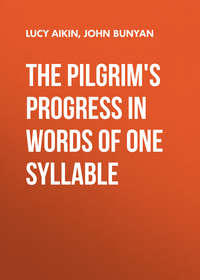 полная версия
полная версияMemoirs of the Court of Queen Elizabeth
The death of archbishop Grindal in 1583 afforded the queen the long desired opportunity of elevating to the primacy a prelate not inclined to offend her, like his predecessor, by any remissness in putting in force the laws against puritans and other nonconformists. She nominated to this high dignity Whitgift bishop of Worcester, known to polemics as the zealous antagonist of Cartwright the puritan, and further recommended to her majesty by his single life, his talents for business, whether secular or ecclesiastical, his liberal and hospitable style of living, and the numerous train of attendants which swelled the pomp of his appearance on occasions of state and ceremony, when he even claimed to be served on the knee.
This promotion forms an important æra in the ecclesiastical history of the reign of Elizabeth: but only a few circumstances more peculiarly illustrative of the sentiments and disposition of Whitgift, of the queen herself, and of some of her principal counsellors, can with propriety find a place in a work like the present.
To bring back the clergy to that exact uniformity with respect to doctrines, rites, and ceremonies, from which the lenity of his predecessor had suffered them in many instances to recede, appeared to the new primate the first and most essential duty of his office; and the better to enforce obedience, he eagerly demanded to be armed with that plenitude of power which her majesty as head of the church was authorized to delegate at her pleasure. His request was granted with alacrity, and the work of intolerance began. Subscriptions were now required of the whole clerical body to the supremacy; to the book of Common-prayer; and to the articles of religion settled by the convocation of 1560. In consequence of this first step alone, so large a number of zealous preachers and able divines attached to the Calvinistic model were suspended from their functions for non-compliance, that the privy-council took alarm, and addressed a letter to the archbishop requesting a conference; but he loftily reproved their interference in matters of this nature, declaring himself amenable in the discharge of his functions to his sovereign alone. In the following year he prevailed upon her majesty to appoint a second high-commission court, the members of which were authorized, ex officio, to administer interrogatories on oath in matters of faith;—an assumption of power not merely cruel and oppressive, but absolutely illegal, if we are to rely on Beal, clerk of the council, an able and learned but somewhat intemperate partisan of the puritans, who published on this occasion a work against the archbishop. To enter into controversy was now no part of the plan of Whitgift; he held it as a maxim, that it was safer and better for an established church to silence than to confute; and a book of Calvinistic discipline having issued from the Cambridge press, he procured a Star-chamber decree for lessening and limiting the number of presses; for restraining any man from exercising the trade of a printer without a special license; and for subjecting all works to the censorship, of the archbishop or the bishop of London. At the same time he vehemently declared that he would rather lie in prison all his life, or die, than grant any indulgence to puritans; and he expressed his wonder, as well as indignation, that men high in place should countenance the factious portion of the clergy, low and obscure individuals and not even considerable by their numbers, against him the second person of the state. The earl of Leicester was not however to be intimidated from extending to these conscientious sufferers a protection which was in many instances effectual: Walsingham occasionally interceded in behalf of Calvinistic preachers of eminence; and sir Francis Knolles, whose influence with the queen was considerable, never failed to encounter the measures of the primate with warm, courageous, and persevering opposition. Even Burleigh, whom Whitgift had regarded as a friend and patron and hoped to number among his partisans, could not forbear expressing to him on various occasions his serious disapprobation of the rigors now resorted to; nor was he to be silenced by the plea of the archbishop, that he acted entirely by the command of her majesty. On the contrary, as instances multiplied daily before his eyes of the tyranny and persecution exercised, through the extraordinary powers of the ecclesiastical commission, on ministers of unblemished piety and often of exemplary usefulness, his remonstrances assumed a bolder tone and more indignant character: as in the following instance. "But when the said lord treasurer understood, that two of these ministers, living in Cambridgeshire, whom for the good report of their modesty and peaceableness he had a little before recommended unto the archbishop's favor, were by the archbishop in commission sent to a register in London, to be strictly examined upon those four and twenty articles before mentioned, he was displeased. And reading over the articles himself, disliked them as running in a Romish style, and making no distinction of persons. Which caused him to write in some earnestness to the archbishop, and in his letter he told him, that he found these articles so curiously penned, so full of branches and circumstances, as he thought the inquisitors of Spain used not so many questions to comprehend and to trap their preys. And that this juridical and canonical sifting of poor ministers was not to edify and reform. And that in charity he thought, they ought not to answer to all these nice points, except they were very notorious offenders in papistry or heresy: Begging his grace to bear with that one fault, if it were so, that he had willed these ministers not to answer those articles, except their consciences might suffer them94."
The archbishop, in a long and labored answer, expressed his surprise at his lordship's "vehement speeches" against the administering of interrogatories, "seeing it was the ordinary course in other courts: as in the star-chamber, in the courts of the marches, and in other places:" and he advanced many arguments, or assertions, in defence of his proceedings, none of which proved satisfactory to the lord treasurer, as appeared by his reply. In the end, the archbishop found himself obliged to compromise this dispute by engaging that in future the twenty-four articles should only be administered to students in divinity previously to their ordination; and not to ministers already settled in cures, unless they should have openly declared themselves against the church-government by law established. But this instance of concession extorted by the urgency of Walsingham appears to have been a solitary one; the high commission, with the archbishop at its head, proceeded unrelentingly in the work of establishing conformity, and crushing with a strong hand all appeals to the sense of the public on controverted points of discipline or doctrine. The queen, vehemently prepossessed with the idea that the opposers of episcopacy must ever be ill affected also to monarchy, made no scruple of declaring, after some years experience of the untameable spirit of the sect, that the puritans were greater enemies of hers than the papists; and in the midst of her greatest perils from the machinations of the latter sect, she seldom judged it necessary to conciliate by indulgence the attachment of the former. Several Calvinistic ministers, during the course of the reign, were subjected even to capital punishment on account of the scruples which they entertained respecting the lawfulness of acknowledging the queen's supremacy: on the other hand, the attempts of sir Francis Knowles to inspire her majesty with jealousy of the designs of the archbishop, by whom some advances were made towards claiming for the episcopal order an authority by divine right, independently of the appointment of the head of the church, failed entirely of success. No ecclesiastic had ever been able to acquire so great an ascendency over the mind of Elizabeth as Whitgift; there was a conformity in their views, and in some points a sympathy in their characters; which seem to have secured to the primate in all his undertakings the sanction and approval of his sovereign: his favor continued unimpaired to the latest hour of her life: it was from his lips that she desired to receive the final consolations of religion; and regret for her loss, from the apprehension of unwelcome changes in the ecclesiastical establishment under the auspices of her successor, is believed to have contributed to the attack which carried off the archbishop within a year after the decease of his gracious and lamented mistress.
Elizabeth took an important though secret part in the struggles for power among the Scottish nobles of opposite factions by which that kingdom was now agitated during several years. It has been suspected, but seems scarcely probable, that she was concerned in the conspiracy of the earl of Gowry for seizing the person of the young king; she certainly however interposed afterwards to mitigate his just anger against the participators in that dark design. On the whole, she was generally enabled to gain all the influence in the court of Scotland which she found necessary to her ends; for James could always be intimidated, and his minions most frequently bribed or cajoled. She regarded it however as an object of some consequence to gain an accurate knowledge of the character and capacity of her young kinsman, from one on whom she could rely; and for this purpose she prevailed on Walsingham, notwithstanding his age and infirmities, to undertake an embassy into Scotland, of which the ostensible objects were so trifling that its real purpose became perfectly evident to the more sagacious of James's counsellors. Melvil confesses, that it cost him prodigious pains to equip the king, at short notice, with so much of artificial dignity and borrowed wisdom as might enable him to pass successfully through the ordeal of Walsingham's examination. But his labor was not thrown away; for James, who really possessed considerable quickness of parts and a competent share of book learning, played with such plausibility the part assigned him, that even this sagacious statesman is believed to have returned impressed with a higher opinion of his abilities than any part of his after conduct was found to warrant.
Her increasing apprehensions from the hostility of the king of Spain, caused Elizabeth to cultivate with added zeal the friendship of the northern powers of Europe, and in 1582 she sent the garter to the king of Denmark as a pledge of amity; making at the same time a fruitless endeavour to obtain for English merchant ships some remission of the duties newly levied by the Danish sovereign on the passage of the Sound. It was the prudent practice of her majesty to intrust these embassies of compliment to young noblemen lately come into possession of their estates, who, for her favor and their own honor, were willing to discharge them in a splendid manner at their private expense. The Danish mission was the price which she exacted from Peregrine Bertie, lately called up to the house of peers as lord Willoughby of Eresby in right of his mother, for her reluctant and ungracious recognition of his undeniable title to this dignity. On the occurrence of this first mention of a high-spirited nobleman, afterwards celebrated for a brilliant valor which rendered him the idol of popular fame, the remarkable circumstances of his birth and parentage must not be omitted. His mother, only daughter and heir of the ninth lord Willoughby by a Spanish lady of high birth who had been maid of honor to queen Catherine of Arragon, was first the ward and afterwards the third wife of Charles Brandon duke of Suffolk, by whom she had two sons, formerly mentioned as victims to the sweating-sickness.
Few ladies of that age chose long to continue in the unprotected state of widowhood; and the duchess had already re-entered the matrimonial state with Richard Bertie, a person of obscure birth but liberal education, when the accession of Mary exposed her to all the cruelties and oppressions exercised without remorse by the popish persecutors of that reign upon such of their private enemies as they could accuse of being also the enemies of the catholic church. The duchess, during the former reign, had drawn upon herself the bitter enmity of Gardiner by some imprudent and insulting manifestations of her abhorrence of his character and contempt for his religion; and she now learned with dismay that it was his intention to subject her to a strict interrogatory on the subject of her faith.
Except apostasy, there was no other resource than the hazardous and painful one of voluntary banishment, and this she without hesitation adopted. Bertie first obtained license for quitting the country on some pretended business; and soon after, the duchess, attended only by two or three domestics, escaped by night with her infant daughter from her house in Barbican, and taking boat on the Thames arrived at a port in Kent. Here she embarked; and through many perils,—for stress of weather compelled her to put back into an English port, and the search was every where very strict,—she reached at length a more hospitable shore, and rejoined her husband at Santon in the duchy of Cleves. From this town, however, they were soon chased by the imminent apprehension of molestation from the bishop of Arras. It was on an October evening that, followed only by two maid-servants, on foot, through rain and mire and darkness, Bertie carrying a bundle and the duchess her child, the forlorn wanderers began their march for Wesel one of the Hanse-towns, about four miles distant. On their arrival, their wild and wretched appearance, with the sword which Bertie carried, gave them in the eyes of the inhabitants so suspicious an appearance, that no one would harbour them; and while her husband ran from inn to inn vainly imploring admittance, the afflicted duchess was compelled to betake herself to the shelter of a church porch; and there, in that misery and desolation and want of every thing, was delivered of a child, to whom, in memory of the circumstance, she gave the name of Peregrine. Bertie meantime, addressing himself in Latin to two young scholars whom he overheard speaking together in that language, obtained a direction to a Walloon minister, to whom the duchess had formerly shown kindness in England. By his means such prompt and affectionate succour was administered as served to restore her to health; and here for some time they found rest for the sole of their foot. A fresh alarm then obliged them to remove into the dominions of the Palsgrave, where they had remained till the supplies which they had brought with them in money and jewels were nearly exhausted; when a friend of the duchess's having interested the king of Poland in their behalf, they fortunately received an invitation from this sovereign. Arriving in his country, after great hardships and imminent danger of their lives from the brutality of some soldiers on their way, a large demesne was assigned them by their princely protector, on which they lived in great honor and tranquillity till the happy accession of Elizabeth recalled them to their native land.
Peregrine lord Willoughby found many occasions of distinguishing himself in the wars of Flanders, where he rose to the rank of lieutenant-general. He was not less magnanimous than brave; and disdaining the servility of a court life, is thought to have enjoyed on this account less of the queen's favor than her admiration of military merit would otherwise have prompted her to bestow upon him. He died governor of Berwick in 1601; his son was afterwards created earl of Lindsey, and the title of duke of Ancaster is now borne by his descendants.
The king of Sweden, conducted to the brink of ruin by an unequal contest with the arms of Russia, sent in 1583 a solemn embassy to the queen of England to entreat her to mediate a peace for him. This good work, in which she cheerfully engaged, was speedily brought to a happy issue; and the Czar seized the opportunity of the negotiations to press for the conclusion of that league offensive and defensive with England, which he had formerly proposed in vain. The objection that such an alliance was inconsistent with the laws of nations, since it might engage the queen to commit hostilities on princes against whom she had never declared war, made, as might be expected, little impression on this barbarian; and Elizabeth had considerable difficulty in escaping from the intimate embrace of his proffered friendship, to the cool civilities of a commercial treaty. Another perplexing circumstance occurred. The Czar had set his heart upon an English wife; some say he ventured to address the queen herself; but however this might be, she was about to gratify his wish by sending him for a bride a lady of royal blood, sister of the earl of Huntingdon, when the information which she received of the unlimited privilege of divorce exercised by his Muscovite majesty, deterred her from completing her project. She was in consequence obliged to excuse the failure on the ground of the delicate health of the young lady, the reluctance of her brother to part with her, and, what must have filled the despot with astonishment, her own inability to dispose of her female subjects in marriage against the consent of their own relations.
About this time died the earl of Sussex. In him the queen was deprived of a faithful and honorable counsellor and an affectionate kinsman; Leicester lost the antagonist whom he most dreaded, and the nobility one of its principal ornaments. Dying childless, his next brother succeeded him, in whom the race ended; for Egremond Ratcliffe, his youngest brother, had already completed his disastrous destiny. This unfortunate gentleman, it will be remembered, was rendered a fugitive and an outlaw by the part which he had taken, at a very early age, in the Northern rebellion. For several years he led a forlorn and rambling life, sometimes in Flanders, sometimes in Spain, deriving his sole support from an ill paid pension and occasional donations of Philip II., and often enduring extremities of poverty and hardship.
Wearied with so many sufferings in a desperate cause, he then employed all his endeavours to make his peace at home; and impatient at length of the suspense which he endured, he took the step of returning to England at all hazards and throwing himself on the compassion of lord Burleigh. The treasurer, touched with his misery and his expressions of penitence, interceded with the queen for his pardon; but she, on some fresh occasion of suspicion, caused him to be advised to steal out of the kingdom again; and neglecting this intimation, he was committed to the Tower. After some months he was released, possibly under a promise of attempting some extraordinary piece of service to his country, and was sent back to Flanders, where he was soon after apprehended on a charge of conspiring against the life of don John of Austria: some say, and some deny, that he confessed his guilt, and accused the English ministry of a participation in the design: however this might be, he perished by the hand of public justice, a lamentable victim to the guilty violence of the popish faction which first beguiled his inexperience; to the relentless policy of Elizabeth, which forbade the return of offenders perhaps not incorrigible; and to the desperation which gaining dominion over his mind had subverted all its moral principles.
Ireland had been as usual the scene of much danger and disturbance. In 1582 an attempt was made by the king of Spain to incite the catholic inhabitants to a general rebellion, by throwing on the coast a small body of troops seconded by a very considerable sum of money, and attended by a number of priests prepared to preach up his title to the sovereignty of the island in virtue of the papal donation. But the vigorous measures of Arthur lord Grey the deputy, by holding the Irish in check, rendered this effort abortive. The Spaniards, unable to penetrate into the country, raised a fort near the place of their landing, which they hoped to be able to hold out till the arrival of reinforcements. They obstinately refused the terms of surrender first offered them by the deputy; and the fort being afterwards taken by assault, the whole garrison, with the exception of the officers, was put to the sword: an act of cruelty which the deputy is said to have commanded with tears, in obedience to the decision of a court-martial from which he could not venture to depart; and which Elizabeth publicly reprobated, perhaps without internally condemning.
The earl of Desmond, who on the arrival of the Spanish troops had risen in arms against the government with all the power he could muster, was excepted from the general pardon granted to other Irish insurgents, and thus remaining by necessity in a state of rebellion, gave for some time considerable disquiet, if not alarm, to the English government. But his resources of every kind gradually falling off, he was hunted about through bogs and forests, from one fastness or lurking-place to another, enduring every kind of privation and hardship, and often foiling his pursuers by hair-breadth scapes. It is even related that he and his countess on one occasion being roused from their bed in the middle of the night, found no other mode of concealment than that of wading up to their necks in the river which bathed the walls of their retreat. At length, a small party of soldiers having entered by surprise a solitary cabin, they there found one old man sitting alone, to whom their brutal leader gave a blow with his sword, which nearly cut off his arm, and another on the side of his head; on which he cried out, "I am the earl of Desmond." The name was no protection; for perceiving that he bled fast and was unable to march, the ruthless soldier, bidding him prepare for instant death, struck off his head and brought it away as a trophy; leaving the mangled trunk to the chance of interment by any faithful follower of the house of Fitzgerald who might venture from his hiding-place to explore the fate of his chief. The head was sent to England as a present to the queen, and placed by her command on London Bridge.
From this time, the beginning of 1583, Ireland enjoyed a short respite from scenes of violence and blood under the vigorous yet humane administration of sir John Perrot, the new deputy.
The petty warfare of this turbulent province, amid the many and great evils of various kinds which it brought forth, was productive however of some contingent advantage to the queen's affairs, by serving as a school of military discipline to many an officer of merit whose abilities she afterwards found occasion to employ in more important enterprises to check the power of Spain. Ireland was, in particular, the scene of several of the early exploits of that brilliant and extraordinary genius Walter Raleigh; and it was out of his service in this country that an occasion arose for his appearing before her majesty, which he had the talent and dexterity so to improve as to make it the origin of all his favor and advancement. Raleigh was the poor younger brother of a decayed but ancient family in Devonshire. His education at Oxford was yet incomplete, when the ardor of his disposition impelled him to join a gallant band of one hundred volunteers led by his relation Henry Champernon, in 1569, to the aid of the French protestants. Here he served a six-years apprenticeship to the art of war, after which, returning to his own country, he gave himself for a while to the more tranquil pursuits of literature; for "both Minervas" claimed him as their own. In 1578 he resumed his arms under general Norris, commander of the English forces in the Netherlands; the next year, ambitious of a new kind of glory, he accompanied that gallant navigator sir Humphrey Gilbert, his half brother, in a voyage to Newfoundland. This expedition proving unfortunate, he obtained in 1580 a captain's commission in the Irish service; and recommended by his vigor and capacity, rose to be governor of Cork. He was the officer appointed to carry into effect the bloody sentence passed upon the Spanish garrison; a cruel service, but one which the military duty of obedience rendered matter of indispensable obligation. A quarrel with lord Grey put a stop to his promotion in Ireland; and on his following this nobleman to England, their difference was brought to a hearing before the privy-council, when the great talents and uncommon flow of eloquence exhibited by Raleigh in pleading his own cause, by raising the admiration of all present, proved the means of introducing him to the presence of the queen. His comely person, fine address, and prompt proficiency in the arts of a courtier, did all the rest; and he rapidly rose to such a height of royal favor as to inspire with jealousy even him who had long stood foremost in the good graces of his sovereign.





